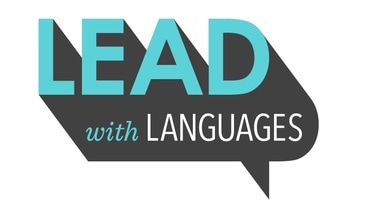Sessions
Conference Program |
| ||||||
|
Opening Session
Multilingual ≠ Multicultural: Challenging Assumptions in the World Language Classroom “Language is a tool that enables us to expand our chances of learning about the lives and values of people throughout the world as well as promoting heart-to-heart exchanges.” --Daisaku Ikeda World language educators are uniquely poised to be leaders in creating multicultural schools and communities, but we are often given a pass because we assume multiculturalism is inherent to multilingualism. When multiculturalism occurs, a community recognizes differences and similarities that exist in various cultures, and supports equity and social justice for all members. In this workshop we will explore the differences between multilingualism and multiculturalism and where they intersect. Teachers will leave with concrete strategies and skills to build empowering, multicultural classrooms. Language Classroom Rachelle Adams and Anna Gilcher |
Lead with Languages: Join the National Movement
Erin M. Whelchel, American Council on the Teaching of Foreign Languages (ACTFL) |
|
French Embassy Initiatives for Dual Language and Immersion Programs
This presentation is an overview of the initiatives of the French Embassy to promote K-12 dual language and immersion programs in public schools in the U.S. These initiatives include professional development for teachers (in the U.S. and in France), funding teaching resources and French teaching interns, and funding creative programming in and out of the classroom. Karl Coward and Natalie Cox, French Embassy in the United States Mindfulness in language teaching Mindfulness puede transformar la clase de español de manera positiva. Esta práctica secular de atención plena al momento presente reduce el estrés y la frustración que muchas veces implica el aprendizaje de una lengua extranjera. Al enfocarse en sus propios estados emocionales durante parte de la clase, los estudiantes pueden sentirse más conectados consigo mismos y con los otros miembros del grupo. Esto ayuda a que cada uno esté mejor preparado para dedicarse a sus metas académicas e, incluso, ir más allá. Esta presentación utiliza herramientas que incentivan la relajación y la creatividad tanto de los educadores como de sus estudiantes. Dr. Monica D. Mulholland, The Catholic University Connecting, Reflecting, Reporting - Highlights from the 2017 Central States Conference on the Teaching of Foreign Languages What's thaTFL buzz? TELL me what's happening at the 2017 Central States Conference on the Teaching of Foreign Languages Have you ever wondered how teachers from across the country are solving today's challenges in the modern language classroom? Looking for fresh ideas and perspectives from language professionals outside of the Washington Metropolitan community? This session will highlight the trends in language teaching methodology, theory and practice presented at the CSCTFL in Chicago in March. Is the grass greener in the 1:1 classroom? How do we design classroom activities to meet the unique learning characteristics of Generation Z students? What are the top 25 buzz words you need to know about language teaching methodology, theory and practice today? Stacy Capra, Fairfax County Public Schools Engaging Activities for our Diverse Language Learners in the Differentiated Classroom When we meet the needs of the diverse learners in the language classroom we help them learn and be successful. Discover how integrating various learning strategies and simple modifications can not only meet the needs of all learners, but also energize your classroom. Trough Differentiated Instruction we can provide an inspiring and engaging experience to help students reach their highest potential. Get your students enthusiastically participating every day with technology, cooperative activities and games! In this workshop, I will be sharing the journey of the differentiated classroom at Norwood School. Teachers must bring a device (tablet or smartphone) in order to get the full experience. All ideas presented may be implemented with any language. This workshop will be hands-on — be prepared to practice some of the activities presented so that you can use them as soon as you return to your classroom! If it is possible, I recommend you to download a QR code reader App in advance! Join the conversation by adding your ideas or questions here: https://padlet.com/kadamson72/uthwj2jyol02 Karen Adamson, Norwood School Social Justice in the Spanish Classroom In Latin American Studies students build language skills as well as empathy through the studies of the region's struggles for social equality. This workshop will provide a sample of some of the topics covered and resources used to supplement discussions. We will also discuss activities that help students build their language skills during and at the conclusion of units. Throughout the year students build their voice of empathy in the target language. Bryan Whitford, Bullis School STREAM in the Language Classroom (Chinese) By engaging learners with hands-on activities and performance-based projects in language classrooms, content areas such as science, technology, reading, engineering, art and math are integrated in an immersion setting. Presenters will demonstrate how to make STREAM kits that can be used in a variety of ways to create innovative learning opportunities for language learners in your classrooms. Pei-Hsuan Liu, Jing Shen, Liangzi Zhang, Prince George’s County Public Schools Connecting, Reflecting, Reporting - Highlights from the 2017 Central States Conference on the Teaching of Foreign Languages What's thaTFL buzz? TELL me what's happening at the 2017 Central States Conference on the Teaching of Foreign Languages. Have you ever wondered how teachers from across the country are solving today's challenges in the modern language classroom? Looking for fresh ideas and perspectives from language professionals outside of the Washington Metropolitan community? This session will highlight the trends in language teaching methodology, theory and practice presented at the CSCTFL in Chicago in March. Is the grass greener in the 1:1 classroom? How do we design classroom activities to meet the unique learning characteristics of Generation Z students? What are the top 25 buzz words you need to know about language teaching methodology, theory and practice today? Stacy Capra, Fairfax County Public Schools Cuba for students and educators: Updates on new cultural and educational opportunities. This presentation reflects on the new changes experienced by Cuba and the implications of these changes for students and educators. The purpose is for educators and students to explore the opportunities of exploring Cuba’s culture and education. In addition, the presentation also shares immersion programs that some universities and schools are offering at their institutions by partnering up with Cuban educational organizations. Luis Javier Pentón Herrera, Prince George County Public Schools |
The Whos, Whats, and Hows of Language Advocacy
This session will present an overview of current Federal policy priorities and recommendations for the language field. It will also discuss initiatives taking place nationally to advance language policy priorities, and provide information and examples for becoming involved in language advocacy at all levels. Maria Pulcini, Joint National Committee for Languages Make Google apps work for your immersion class Participants will identify how to use the google for classroom technology to enhance language acquisition in an immersion class by supporting the SWRL,(Writing, reading, listening and speaking). Bete Yilma, Montgomery County Public Schools Best Practices in Lesson Planning for the World Languages/Immersion Class This session will discuss the most efficient ways to lesson plan and other best practices that will allow teachers to get the most out of their instruction. Jane Ness, Prince George’s County Public Schools #Charlaele1: A Twitter chat for Spanish teachers Presentación sobre #charlaele1, un chat twitter para profesionales de la enseñanza de español, organizado cada 15 días sobre diferentes temas relacionados con la enseñanza de español a personas de diferentes edades. Intercambiamos ideas, materiales, etc. Laura García-Largo, Powell Elementary Bilingual School - DCPS Ideas for Engaging and Motivating Students in Your Spanish Classes If you’re looking for ideas to help get your elementary and middle school students actively engaged and excited about learning Spanish, then look no further! Engage students in the learning process through incorporating exciting activities that foster collaboration, cultural connections, and autonomous learning. The presenters will share a selection of fun and highly effective activities and online resources, readers and songs that increase your students' motivation and participation. You will leave this workshop with new ideas that will help build fluency, boost students’ confidence, and create a fun learning environment! Barbara Mark, Carmen Herrera EMC Publishing Tech Tools for the Proficiency Classroom
Each teacher hopes for technology tools that can significantly help their students become more engaged with the material, and they also hope that this technology is easy to implement and provides differentiation. This presentation will demonstrate how to incorporate technology into a proficiency-based classroom easily. These technology tools and tips can help to find authentic resources, collect feedback during interpretive reading and listening activities, and practice both written and spoken interpersonal and presentational tasks. The tools that I use are frequently cited as my students’ favorite activities. In addition, many of these tools can be easily incorporated with minimal effort from the teacher. Maris Hawkins, Bullis School Can Removing the Mystery from spelling the French “A” sound significantly enhance student capacity to learn multiple verb tenses, “eh”? Having taught nursery through Graduate level French has provided myriad opportunities for gathering data, particularly via direct observation. I have seen young children learn present, future, imperfect, conditional, imperative, and infinitive verb forms using song and TPR, while adolescents oftentimes struggle with learning the present tense. Nevertheless, maintaining rigor, while improving self-confidence, is a tricky balance. Enhancing an understanding the “A” sound accelerates learning multi- tense verb conjugation, including regular, as well as essential irregular verbs in the French language. Edward Warfield, Prince George’s County Public Schools Cultivating Students’ Engagement and Increasing Presence in Hybrid and Online Classes Hybrid and online classes are very popular these days. The flexibility, convenience, and availability allow students to be able to take classes and at the same time have jobs, careers, and/or families. The problem with the asynchronous courses, often with limited interaction between students and instructors, take a toll in students’ interest and engagement in the class. By the 4th or 5th week into the semester, students’ presence starts to decline. This lack of presence can negatively affect learning and the course outcomes. In this session, you will learn different strategies on how to keep your students engaged throughout the semester and increase students’ and instructors’ presence in the class. You will be able to use some of these ideas right away. Silvana R. McGillis, Penn State University-Abington (Missing) Multiculturalism and Unique Historical/Cultural Voices: Several Approaches to Developing Interactive Foreign Language Modules in Spanish This session will situate Hispanic culture within its historical context, highlighting and valuating its multicultural diversity which includes European, African, and Native American interconnectedness—providing a special focus on revelations that focus on pioneering examples of the heritage and legacy of the Spanish and the African descendants inside and outside of the United States. The pedagogical approach is multifaceted in its structured presentation of foreign language content modules that support learning outcomes and assessments based on authentic historical and cultural representations The interactive, communicative classroom will target, inform, and enrich the global community outreach of today’s students of foreign languages. (The panelists will incorporate powerpoint and interactive cultural activities.) Dr. Annette Ivory Dunzo, Mesi Walton, Howard University |
Guided Discussion

World Language educators come together to pitch ideas for their colleagues and participate in discussions.
To add your ideas to the topic suggestion board click here or scan the QR Code. Please specify if you would be interested in leading a session. You lead a discussion by posting a “first question,” or by sharing information about your suggested topic.
To add your ideas to the topic suggestion board click here or scan the QR Code. Please specify if you would be interested in leading a session. You lead a discussion by posting a “first question,” or by sharing information about your suggested topic.
4th Annual GWATFL Spring Immersion Day
April 29th, 2017 - National Cathedral School. Washington, DC
April 29th, 2017 - National Cathedral School. Washington, DC

